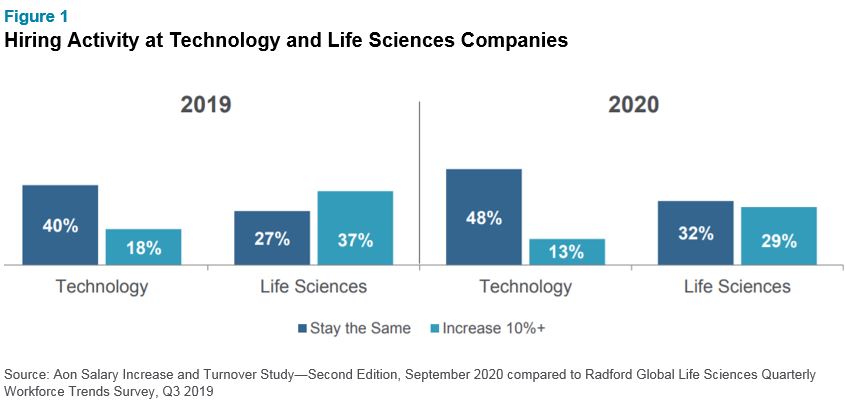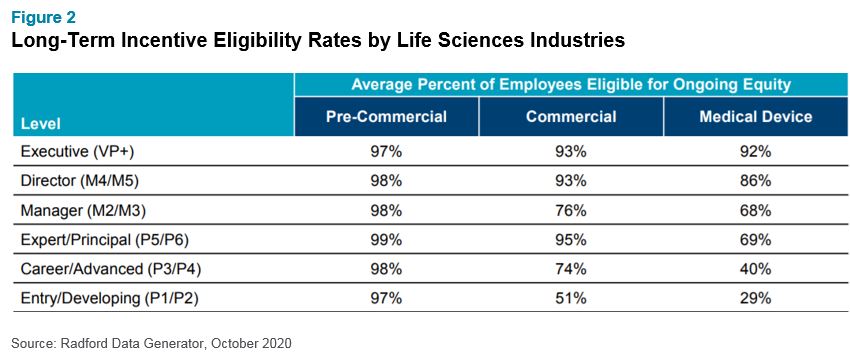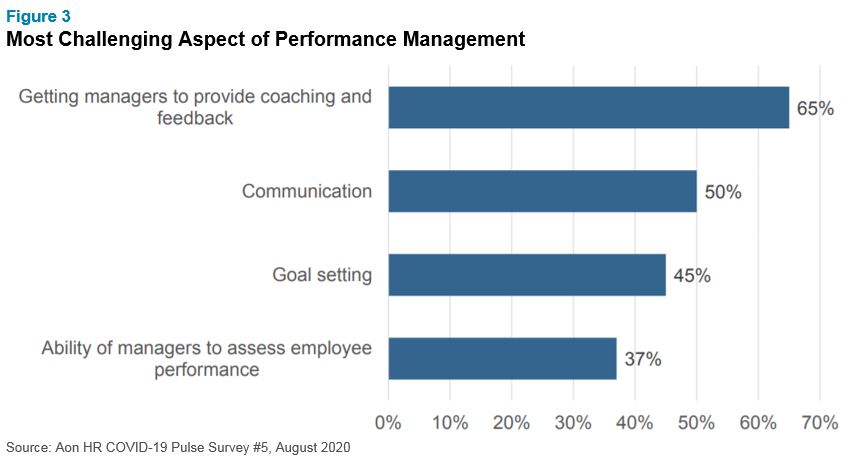During a recent webcast, our life sciences industry experts shared data and insights on trends in the area of digital skills, incentive plans, location-based pay and performance management.

Business leaders in the life sciences industry are focused on reevaluating and optimizing their total rewards, building digital skills among their workforce, analyzing their location strategy, and looking at ways to adjust the impact and differentiation of their incentive programs. Those are some of the latest HR trends our industry experts discussed during a recent webinar. (Click here for a recording of the webinar.)
The COVID-19 pandemic has changed what some employees value from their total rewards, including enhanced sick leave, wellbeing programs and workplace flexibility. As a result, many leaders are reevaluating their employee value proposition and total rewards offering to ensure it is being optimized. (For more information on total rewards optimization, see our recent article To Create a Win-Win Total Rewards Strategy, Start by Understanding Employee Preferences.)
Beyond compensation, the pandemic has accelerated the digitization within the life sciences sector, which was already well underway. From the expansion of telemedicine, rapid speed of vaccine research and trials, access to testing kits, and the need for advanced computational analytics to speed drug development, biopharma and medical device firms need people with technology skills in addition to core scientific expertise.
“Several universities have opened up AI research institutes and we’re seeing a partnership between traditional academia and using the latest developments in technology in the life sciences sector,” says Meaghan Piscitelli, partner and global life sciences relationship executive in the rewards solutions practice at Aon.
Another key trend is an enhanced focus on inclusion and diversity (I&D). Many of our life sciences clients tell us they are taking direct, immediate and positive action in converging opportunities of more diverse clinical trials, improved health equity and a more diverse and equal workforce. They are also focusing on diversity in the C-suite and boardroom — some of which is driven by recent regulatory events (for more details, see our article Developments in Board Diversity: Engagement, Disclosure, Proxy Voting, Listing Requirements and Litigation).
Following a discussion of key hot topics, our panel of industry experts dove deeper into compensation and talent data trends.
The Current State of Hiring
Compared to industries like retail and transportation & mobility, the life sciences sector has fared well during the pandemic. There was a slowdown in hiring in 2020 vs. 2019, but activity has picked up in recent months and a higher percentage of life sciences firms report robust hiring activity compared to the technology sector.

Along with hiring, voluntary turnover has also slowed to 11% for U.S. life sciences firms. “As companies worked to ensure employee safety and wellbeing, and provide access to tools to work from home, employees were not necessarily thinking about moving and changing jobs,” says Tanaz Moazami, associate partner and global life sciences product and data strategy leader in the rewards solutions business at Aon.
Incentive Program Trends
With limited merit budgets that have remained stagnant around 3% in the U.S., firms are putting more emphasis into making their incentive programs meaningful and differentiated for high-impact talent.
A select number of our life sciences clients are ensuring their employees do not receive much lower incentive payouts for missing goals that may have been outside of their control because of the pandemic. However, the vast majority of firms are following their typical bonus process.
With regards to long-term incentives, our data shows consistency with prior years in eligibility and target levels. Pre-commercial firms generally have broader eligibility that scales back for lower job levels at larger commercial firms. Meanwhile, medical device firms have selected eligibility and target equity amounts for executive and director job levels compared to lower levels, similar to technology firms.

Developing a Location-Based Pay and Hiring Program
Some life sciences firms are adopting permanent work-from-home arrangements for certain employees, representing an opportunity for businesses to evaluate geographic-based pay and different talent sourcing models.
“Adopting a more flexible geographic pay approach might open more doors to sourcing talent in new locations that may also be more affordable, such as Austin, Texas. This increase in flexibility will benefit your organization but may add complexity — whether it is design of your program or communication of your philosophy,” Moazami says.
For more information about adopting a location-based pay and talent program, read our recent articles Location-Based Pay Heats Up as Workforces Remain Remote and Addressing Location Strategy in Europe With a Rising Virtual Workforce.
One of the challenges with remote work is performance management tools. Results from our five COVID-19 pulse surveys, conducted from March through August, show that managers are spending more time evaluating their communication methods to their teams, as shown in Figure 3.

Altering the goal-setting process is the most prevalent change life sciences firms are making in the area of performance management, with 24% reporting they have already made changes and 18% considering changes.
Next Steps
While 2020 was certaintly a challenging year, the life sciences sector experienced tremendous advancements. Now is an opportune time for HR leaders to reevaluate their total rewards programs and philosophies to ensure they are meaningful and impactful given the change in the way people work and what they value.
An effective total rewards strategy needs to afford greater flexibility to meet the needs of a diverse talent base, support all types of workers (e.g., full-time, part-time, contract), be grounded in equitable standards, and differentiate to give the organization a competitive advantage.
For more information about our data and insights in the life sciences sector, please contact one of the authors or write to [email protected].
COVID-19 Disclaimer: This document has been provided as an informational resource for Aon clients and business partners. It is intended to provide general guidance on potential exposures, and is not intended to provide medical advice or address medical concerns or specific risk circumstances. Due to the dynamic nature of infectious diseases, Aon cannot be held liable for the guidance provided. We strongly encourage visitors to seek additional safety, medical and epidemiologic information from credible sources such as the Centers for Disease Control and Prevention and World Health Organization. As regards insurance coverage questions, whether coverage applies or a policy will respond to any risk or circumstance is subject to the specific terms and conditions of the insurance policies and contracts at issue and underwriter determinations.
General Disclaimer: The information contained in this article and the statements expressed herein are of a general nature and not intended to address the circumstances of any particular individual or entity. Although we endeavor to provide accurate and timely information and use sources we consider reliable, there can be no guarantee that such information is accurate as of the date it is received or that it will continue to be accurate in the future. No one should act on such information without the appropriate professional advice after a thorough examination of the particular situation.
Related Articles